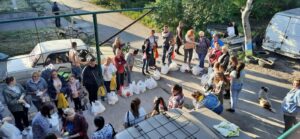A haven of hope.
Anna works for Beginning of Life, FSCI’s partner organisation in Moldova, and specialises in working with young children and vulnerable families. When the war in Ukraine began driving people across the border, she and her colleagues were faced with a humanitarian emergency. Here, Anna tells us about Beginning of Life’s response, and shares her perspective on the events of the last few months.
 Anna, please tell us what the Beginning of Life team did in response to the realisation that Ukrainians were arriving in Moldova in large numbers and needing help.
Anna, please tell us what the Beginning of Life team did in response to the realisation that Ukrainians were arriving in Moldova in large numbers and needing help.
It was challenging to decide what we must do; this was the first time we were facing war. On the second day of the war the Beginning of Life team got together to try and decide what to do. After some discussion we decided to start a hotline. We didn’t advertise, but information about the hotline got around quickly – people found out about us from each other, or in social media. In the early days the state was not very responsive, so there were endless calls from families that needed housing or practical help in meeting basic needs, and we were mobilising all of our connections and contacts. There were so many calls – in just one day we helped to settle around 150 people.
What issues and needs were the calls about?
At first people needed a place to rest for a night or two, before going on to Europe. Then, after two weeks, there were people who, perhaps for financial and psychological reasons, were not ready to go anywhere and had decided to stay in Moldova, so they were looking for a housing solution. You know, people continued to believe that it would soon be over, and they would be able to safely return home soon. But time passed and people began to run out of resources. The need for food, medicine and toiletries was growing all the time.
Rich and poor were both affected by the flight from the war. We were approached by people who had a comfortable well-off life. They came in cool cars, in expensive clothes, but many had no time to withdraw money from their accounts because the banks did not work, so they arrived with devalued Ukrainian currency, which at first could not be exchanged. Many Moldovan volunteers were indignant and asked: “Why are you sending such rich people to our centres?” Our answer was that they were not rich people anymore, even if their car was a nice one.
We received a woman who looked very good in her expensive coat. She told us that initially she believed the war would be short and, wanting to help somehow, she bought ten kilos of meat every day and sent it to the front. But prices were rising every day, and gradually she spent all her money at the hotel she was staying, and it was not long before she was left with nothing. Now she and her granddaughter needed our help, as they had no money for food and basics, let alone somewhere to stay.
What kind of challenges did you face while working at the hotline?
The fear that someone would call that we wouldn’t be able to help prevented us from sleeping peacefully. I remember one of the most difficult cases: An old gentleman called us, he needed a place to live, medical help, special assistance because of his paralysis, and he had brought his three cats that he did not want to leave behind. We worried about how to find a place that would take him and his cats and provide the medical care he needed. Thanks to God we eventually we found a place in a nursing home that could take care of him and his cats.
We could see that when people were so stressed, they could not anticipate all their needs, so, for example when they had arrived at four in the morning people were thinking about food, and only when evening arrived would they realise that they needed somewhere to sleep, so we would get hysterical calls late in the evening to ask for help with accommodation. Of course, by then all the places are already taken, so we were faced with the possibility that we could not help. Such situations were very stressful but, thanks to God and Beginning of Life’s social capital among the friends that we have worked with for so long, we were able to resolve even the most difficult problems.
How has your collective experience with Beginning of Life helped the work with refugees?
Our previous experience has proven very valuable, and we have been able to adapt and use our existing projects to help meet the needs of the families.
We have opened a group for refugee children in the Early Learning Centre. Our teachers work with them, and the children are able play and learn in a safe, warm and healthy atmosphere. This is especially important considering all that the children have gone through, and the real uncertainty that they face about going home and seeing loved ones again.
The staff at our Restoration and Therapy Centre have extensive experience working with people who suffer with PTSD. Our psychologists apply their experience and skills to help people deal with the traumatic events of the sudden onset of fighting and the flight from war.
We have been able to set up a Humanitarian Assistance Centre to help the growing number of refugees with their practical needs.
How has the situation affected you and your own family?
One day my husband and I went to buy things for refugees. It was the first time he had come into contact with them. I asked him how he felt, and he said, “They are ordinary people just like us”. It’s not like when a person is reaping the consequences for his wrong actions, these people were just living their peaceful life, then they lost everything because of the decisions of others. It is hard and painful when you realise that such things can still happen, and harder to accept our helplessness and inability to change the situation.
I am emotionally shut down now. At first these events caused a strong panic – we were collecting suitcases, making plans to escape. There were tears, fear, sleeplessness, anxiety, along with pity and sympathy. Now you just accept all that is happening even if nothing is normal. I am in day-to-day mode. It is hard to live and dream, so you no longer think about where I will go on vacation, or whether I will finish my repairs, whether my friends will get married. My husband will soon fly away for a work, and I wonder if he will be able to return. Life is now just too many “ifs”.
The war continues to take its toll on the people of Southeast Europe. So many are stuck in a world of “ifs”. But where there are people like Anna, and organisations like Beginning of Life, there are havens of hope for those who are being swept along on a tide of uncertainty and fear.
